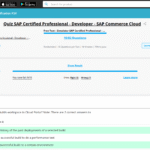The government is proposing an investment of $400 billion in home and community-based services for people with disabilities. While proposed plans focus on creating new jobs and improving the pay and benefits of current caregivers, they will also provide much-needed support for millions of disabled adults, children and their families.
With an early diagnosis of disability in infants, the provision of digital technology to school children, and more support for parents of vulnerable adults, children of all ages can be helped to reach their full potential.
Early Detection And Intervention
Early intervention services have been shown to greatly improve outcomes for a disabled child and their family. Treatments and therapies can help babies as young as three months old and cover developmental stages up to the age of three. Services include occupational therapy to help with fine motor movement, physiotherapy to improve balance and walking, and speech therapy to help develop language skills.
These services are available in every state for any child that meets the criteria for developmental delay. One of the most common disabilities in children is cerebral palsy, affecting around half a million children under the age of 18.
For parents of children with the condition, a cerebral palsy quiz can help them to identify any delays their child might experience in reaching common childhood milestones. With a confirmed diagnosis, treatment can start promptly giving every child a greater chance of leading a full and independent life.
Providing Consistent Access To Education
Evaluation is also an important step in meeting the educational needs of a child with disabilities. In California, there are around 795,000 students enrolled in special education with conditions including cerebral palsy, autism, and learning disabilities. Recent school closures have highlighted the importance of continuing the provision of special education to children with disabilities.
Disability Rights Groups in California would like to see a more consistent approach to delivering educational services. Providing tablets and other digital equipment to access the internet, training teachers in giving virtual lessons, and offering more online services to replace face-to-face therapy sessions could all ensure that children with disabilities are not disadvantaged in times of uncertainty.
Continuing Care For Adult Children
Once a child becomes an adult at the age of 18, they are assumed to be able to make their own decisions, and their parents are no longer legally able to make medical and financial decisions for them. For more profoundly disabled children, parents can apply for guardianship, but this can be a complicated and expensive process, involving lengthy and intrusive investigations of the family.
Parents in Texas are hoping that a change to legislation will make it much more straightforward for them to take over guardianship of their child as they become an adult, ensuring a smooth continuance of care.
With the promise of greater government funding and campaigns that highlight the issues facing families of children with disabilities, access to treatment and care will be made easier for young people during every stage of their childhood.















